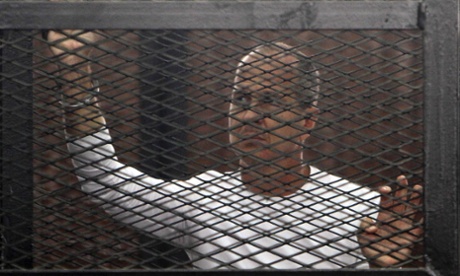
Today, Egypt resumes its trial of the three al-Jazeera journalists it has held in captivity since December on the grounds that their coverage threatened national security. Media outlets, advocacy groups and foreign governments – including the United States – have all condemned the arrests and criticized the proceedings as a bold political move to suppress opposition.
Indeed, even as Washington keeps its distance from the upcoming election, the State Department has insisted upon “the free expression of political views without intimidation or fear of retribution”. Last month, the US, along with other signatories, filed a declaration through the United Nations condemning Egypt for its violent suppression of dissent, including against journalists.
But the brazen political rhetoric out of Cairo continues: that al-Jazeera’s Peter Greste, Mohamed Fahmy and Baher Mohamed are guilty of aiding the Muslim Brotherhood, that the Brotherhood is a terror group, and that counter-terror policy is crucial to democracy at all costs – even at the cost of a free press, that beating heart of democracy.
This rhetoric is not new. Egypt seems to draw inspiration from the very country criticizing it – the United States.
Over the past decade, the US not only detained but tortured al-Jazeera journalists under counterterrorism policies. Now, as its War on Terror diffuses into support for an increasing number of local – and secret – wars on terrorism across the globe, the tactic of imprisoning journalists seems to be catching on.
Ten years ago, the United States also justified its detention of al-Jazeera journalists by claiming a “national security threat”. These arrests could not be cloaked as mere collateral damage in a messy war. The US, then as Egypt does now, made leaping connections between the news network and militants, and specifically targeted those whose coverage did not serve the military’s objectives: Dick Cheney warned that al-Jazeera risked being “labeled as ‘Osama’s outlet to the world’”; Donald Rumsfeld called the network’s coverage of the Iraq war “vicious, inaccurate, inexcusable”.
Over the next several years, US forces arrested and detained al-Jazeera journalists like Sami al Hajj and Salah Hasan Nusaif Jasim al Ejaili. US military forces captured both in separate instances while they were doing their jobs, and tortured them while attempting to establish ties between al-Jazeera and al-Qaida. Neither al Hajj nor al Ejaili received justice for their wrongful detention. After seven years of imprisonment in Guantanamo Bay, the US government released al Hajj to Sudanese authorities, without any reparations. Meanwhile al Ejaili, who was detained at Abu Ghraib, brought a case with other victims against the private military contractor at the prison, alleging it conspired to commit torture and war crimes. But the case was dismissed by the district court. The court perversely ordered al Ejaili and other plaintiffs to pay their alleged torturers for the cost of the suit. The case is pending on appeal.
The reverberations of this misguided War on Terror continue, even if the war has shifted: the Obama administration has famously invoked the Espionage Act more than any other American president, attempting to control press leaks with tactics a report found to be “the most aggressive … since the Nixon administration”.
From a War on Terror to a war on leaks, now comes America’s shadow influence in the global war on journalism: when the US downgraded aid to Egypt after the government violently disbanded protests against the state, for example, it continued to supply the government funds for its counter-terrorism efforts – the same efforts that were used to justify the imprisonment of al-Jazeera journalists in the first place.
No wonder Egypt’s UN delegation questioned those countries signing the recent UN declaration on suppression of dissent:
Now, as the fate of three journalists rests in the hands of a government mirroring US policies, the reality of America’s media crackdown could not be starker. Absent a commitment to a free press and accountability for those journalists who have been wrongly accused, arrested and tortured, the ongoing – if evolving – hypocrisy of US policy will continue to serve as justification for untold future harms. And whenever the war on terror does eventually end, and if the smoke clears, it’s frightening to envision what might remain

No comments:
Post a Comment